|
|
|
Sort Order |
|
|
|
Items / Page
|
|
|
|
|
|
|
| Srl | Item |
| 1 |
ID:
127497


|
|
|
|
|
| Publication |
2013.
|
| Summary/Abstract |
CELEBRATIONS took place in August 2013 in the Czech Republic and Russia to mark 200 years since the victory in the Battle of Kulm by the allied forces of Russia, Austria and Prussia over Napoleon's forces.
In order to put in perspective this seemingly local and almost forgotten battle in 1813, where valiant Russian soldiers played a decisive part, let us make a brief historical digression to the now distant period that preceded the fighting at Kulm on 29-30 August 1813 and at Leipzig on October 16-18, 1813.
|
|
|
|
|
|
|
|
|
|
|
|
|
|
|
|
| 2 |
ID:
166543
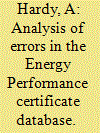

|
|
|
|
|
| Summary/Abstract |
Energy Performance Certificates (EPCs) are the adopted method by which the UK government tracks the progress of its domestic energy efficiency policies. Over 15 million EPCs have been lodged, representing a valuable resource for research into the UK building stock. However, the EPC record has a reputation of containing multiple errors. In this work, we identify many such errors and quantify how common they are. We find that 27% of EPCs in the open EPC record display at least one flag to suggests it is incorrect and estimate the true error rate of the EPC record to be between 36 and 62%. Many of these errors are caused by EPC assessors disagreeing on building parameters such as floor type, wall type and built form. Additionally, flats and maisonettes appear to cause more issues than other property types. This may be due to difficulties in assessing their location in the building and the nature of the surrounding space. We also suggest potential new methods of quality assurance which rely on machine learning and which could allow such errors to be avoided in the future.
|
|
|
|
|
|
|
|
|
|
|
|
|
|
|
|
| 3 |
ID:
133456
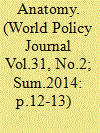

|
|
|
|
|
| Publication |
2014.
|
| Summary/Abstract |
Alternative currency is a privately developed form of money that is used as a substitute to national currency in designated areas. It is not regulated by national governments or banks. A familiar example is the e-currency, Bitcoin. However, Bitcoin is neither the only nor the oldest example of alternative money. The chiemgauer, Brixton pound, sardex, and the dam are examples of alternative money currently in use in Germany, England, Italy, and the Netherlands, respectively. The goal with these currencies is to promote the idea of spending locally. By keeping the currency within the designated area, the local economy is able to prosper regardless of the state of the national economy. This enables communities to establish local markets that are less affected by national trends
|
|
|
|
|
|
|
|
|
|
|
|
|
|
|
|
| 4 |
ID:
084225
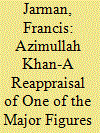

|
|
|
|
|
| Publication |
2008.
|
| Summary/Abstract |
The surviving documentation on Azimullah Khan is unreliable and fragmentary, but a survey suggests that his importance as a leader in the revolt of 1857 may have been exaggerated. His true distinction was as a consultant to the Nana Sahib. A unique personal letter from Azimullah, dating from the years that he spent in England and published here for the first time, reveals him at work behind the scenes on his master's behalf.
|
|
|
|
|
|
|
|
|
|
|
|
|
|
|
|
| 5 |
ID:
123197


|
|
|
|
|
| Publication |
2013.
|
| Summary/Abstract |
OVER A century ago, a talented British newspaperman sent a manuscript on the irrationality of war to numerous London publishers. It was uniformly rejected on the grounds that the public was uninterested in the topic. After he paid a well-known firm to print his opuscule, it quickly garnered praise, and then, a few months later, an expanded edition became a publishing sensation. It sold several million copies and was almost immediately translated into twenty-five languages. At a moment when a highly nationalistic imperial Germany was arming itself to the teeth and Edwardian England was, in turn, bolstering its naval program, the book's thesis was as revolutionary as it was sweeping-that growing economic interdependence among nations rendered renewed conflict a thing of the past.
|
|
|
|
|
|
|
|
|
|
|
|
|
|
|
|
| 6 |
ID:
001410
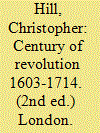

|
|
|
|
|
| Edition |
2nd ed.
|
| Publication |
London, Routledge, 1980.
|
| Description |
296p.Pbk
|
| Standard Number |
0415051789
|
|
|
|
|
|
|
|
|
|
|
|
Copies: C:1/I:0,R:0,Q:0
Circulation
| Accession# | Call# | Current Location | Status | Policy | Location |
| 040965 | 942.06/HIL 040965 | Main | On Shelf | General | |
|
|
|
|
| 7 |
ID:
127258


|
|
|
| 8 |
ID:
134446
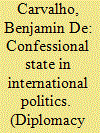

|
|
|
|
|
| Summary/Abstract |
Whilst religion and collective identity have become issues of central concern to international relations scholars, dynastic concerns and national interests still dominate their analyses of early modern international politics. This analysis contributes to the constructivist emphasis on collective identity to foreign policy by examining Tudor England in light of the concept of confessionalisation. Based on the recent historiography of Tudor England, this analysis demonstrates the importance of religion in defining not only the collective identity of international actors, but also their foreign policies, choice of alliances, and, more generally, their international outlook. Through such a lens, it seeks to draw analyses of the confessional state away from their focus on domestic state formation to the “external” dimension of confessionalisation and its importance for international politics.
|
|
|
|
|
|
|
|
|
|
|
|
|
|
|
|
| 9 |
ID:
110158
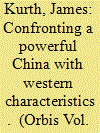

|
|
|
|
|
| Publication |
2012.
|
| Summary/Abstract |
The rapid rise of Chinese economic and military power has produced the most fundamental change in the global system since the end of the Cold War, and it poses vital questions about China's future direction. Many Western analysts argue that China's great power will cause it to become more like the West, i.e., like Western great powers. Other Western analysts believe that China will continue to be the same, i.e., like the China of the past few decades. An alternative interpretation, however, is that China's new power will enable it to become even more Chinese than it is now, i.e., to become more like the traditional and imperial China that existed before the Western intrusions of the 19th century. This China was the "Central State" of a distinctive Chinese world order, operating with distinctive conceptions about diplomatic relations, military strategy, and economic exchange. However, the new China will be unlike the old China in at least two important ways. It will be a naval, and not just a land, power, and it will be a financial, and not just a trading, power. In other words, it will be a powerful China with Western characteristics. As a formidable naval and financial power, China will present fundamental challenges to the United States and to both the long-standing U.S. security order in the Western Pacific and the long-standing "Washington Consensus" about the global economic order.
There was once a great power, one so great that its power not only reached all around the world, but it was recognized as the world's leading power. Its economic practices, political system, and conceptions of international law provided the models and set the standards for numerous other powers. And at the core of its power, and backing up its models, was a special form of military power-the greatest navy in the world-and a special form of economic power, the greatest financial system in the world. That great power was Great Britain, that navy was the Royal Navy, that financial system was centered in the City of London, and that era was just a century ago. However, the greatness of British power had been established almost a century before that, after Britain's victory in the Napoleonic Wars. That victory had largely been won with the advantages provided by the Royal Navy and the Bank of England.
|
|
|
|
|
|
|
|
|
|
|
|
|
|
|
|
| 10 |
ID:
138885
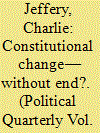

|
|
|
|
|
| Summary/Abstract |
The outcome of the Scottish independence referendum in September 2014 confirmed Scotland's continuing membership of the UK—at least for the time being. It did not take long for some who had campaigned for Scottish independence to begin envisaging a second referendum. Indeed, in early 2015 all the political momentum in Scotland appeared to be with the pro-independence Scottish National Party, which had more than tripled its membership to close to 100,000 since the referendum and had managed a smooth transition from Alex Salmond's leadership to that of Nicola Sturgeon, the new Scottish First Minister. Its main rival in Scotland, the Labour party, found itself in a rather different succession debate, sparked by Johann Lamont's resignation statement complaining about the lack of autonomy given by the party at Westminster to the party in Scotland.
|
|
|
|
|
|
|
|
|
|
|
|
|
|
|
|
| 11 |
ID:
106150
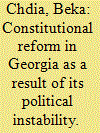

|
|
|
| 12 |
ID:
132604


|
|
|
|
|
| Publication |
2014.
|
| Summary/Abstract |
The United Kingdom is aspiring to reduce the carbon emissions in the building sector, aiming to achieve nearly zero carbon buildings by 2020. The policy models in England and Wales rely on three strands: regulations; financial incentives and educational schemes. A growing body of literature suggests that the building industry is facing several barriers that hinder the delivery of the expected carbon targets outlined at policy level. This research explores the enactment of the policy aspirations by building designers using a bottom-up approach. An ethnographic study was conducted to analyse the design process of six non-domestic buildings. The work identified the designers× responses to adopt the policy agenda in routine design and overcome the challenges that emerged during the design process. The understanding of the designers× responses could inform the policy model and suggest areas that need attention for the timely delivery of the expected carbon reductions.
|
|
|
|
|
|
|
|
|
|
|
|
|
|
|
|
| 13 |
ID:
149246
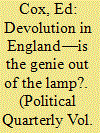

|
|
|
|
|
| Summary/Abstract |
This article explores the extent to which devolution within England can address the general malaise that is often described as ‘the English Question’. It considers how far the devolution genie might be considered out of the lamp. It takes as its basis three broad arguments for devolution—an economic case, a case concerning public service reform and a democratic argument for the decentralisation of power—and for each of these three it explores the theoretical underpinnings for the argument, how things are currently playing out in the current political context and what we might expect to see in the future. The article concludes with some suggestions as to how debates about the English Question might play out in the years ahead.
|
|
|
|
|
|
|
|
|
|
|
|
|
|
|
|
| 14 |
ID:
124408


|
|
|
|
|
| Publication |
2013.
|
| Summary/Abstract |
The UK Government's Department for Energy and Climate Change has been investigating the feasibility of developing a national energy efficiency data framework covering both domestic and non-domestic buildings. Working closely with the Energy Saving Trust and energy suppliers, the aim is to develop a data framework to monitor changes in energy efficiency, develop and evaluate programmes and improve information available to consumers. Key applications of the framework are to understand trends in built stock energy use, identify drivers and evaluate the success of different policies. For energy suppliers, it could identify what energy uses are growing, in which sectors and why. This would help with market segmentation and the design of products. For building professionals, it could supplement energy audits and modelling of end-use consumption with real data and support the generation of accurate and comprehensive benchmarks. This paper critically examines the results of the first phase of work to construct a national energy efficiency data-framework for the domestic sector focusing on two specific issues: (a) drivers of domestic energy consumption in terms of the physical nature of the dwellings and socio-economic characteristics of occupants and (b) the impact of energy efficiency measures on energy consumption.
|
|
|
|
|
|
|
|
|
|
|
|
|
|
|
|
| 15 |
ID:
122169
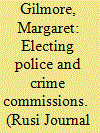

|
|
|
|
|
| Publication |
2012.
|
| Summary/Abstract |
In mid-November 2012, elections will be held in each police force area in England and
Wales, apart from London, for the post of police and crime commissioner. Senior police
officers suggest it will be the biggest shake-up since the first police force was established
by Sir Robert Peel in the early nineteenth century. The government believes the new PCCs
will empower local communities to decide policing priorities in their areas; critics fear
the move is politicising policing and may prove detrimental to national policing needs.
Margaret Gilmore investigates the challenges and the likely impact of this new approach
|
|
|
|
|
|
|
|
|
|
|
|
|
|
|
|
| 16 |
ID:
129989
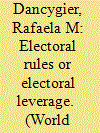

|
|
|
|
|
| Publication |
2014.
|
| Summary/Abstract |
Immigration has fundamentally altered the ethnic and religious makeup of most advanced democracies, but substantial variation is observed in the political representation of immigrant-origin minority groups across countries and cities. Though existing research has highlighted the role of electoral institutions in explaining minority representation, it is often difficult to isolate their effects across contexts. Focusing on Muslims in England and employing a new data set containing over 42,000 candidate-level observations, this article explains Muslim candidate election and selection. To do this, the author makes use of a rule change whereby a subset of localities switched from the use of multimember elections to the use of single-member elections. She finds that these electoral rules have no significant effect on the share of Muslims that gets elected but that they do influence the selection process: in a given election, Muslims are half as likely to be selected when only one seat is up for election as compared with when three seats are in play. Yet parties balance the slate across consecutive single-member elections, leading to similar results across systems. Further, the more undesirable the seat, the more likely it is to have a Muslim on the ticket, but this effect holds only in single-member elections, and it reverses as Muslims gain electoral leverage. Overall electoral leverage proves crucial: the effect of institutions and the potential for institution-based discrimination are conditional on the size and concentration of the local Muslim population and the votes it can deliver at both the election and the selection stages.
|
|
|
|
|
|
|
|
|
|
|
|
|
|
|
|
| 17 |
ID:
111676
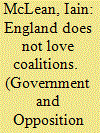

|
|
|
|
|
| Publication |
2012.
|
| Summary/Abstract |
In mid-2011, it certainly looks as if England does not love coalitions, or at any rate the coalition that is governing it. The phrase was coined by Benjamin Disraeli in 1852. This article begins with the context in which Disraeli spoke, then gradually broadens its scope from England to the UK to the set of advanced democracies. Modern political economy has a great deal to say on the subject of coalitions. In conclusion we return to the prospects for future coalitions and minority governments in the UK.
|
|
|
|
|
|
|
|
|
|
|
|
|
|
|
|
| 18 |
ID:
145556


|
|
|
|
|
| Summary/Abstract |
In the 1975 referendum England provided the strongest support for European integration, with a much smaller margin for membership in Scotland and Northern Ireland. By 2015 the rank order of ‘national’ attitudes to European integration had reversed. Now, England is the UK's most eurosceptic nation and may vote ‘Leave’, while Scotland seems set to generate a clear margin for ‘Remain’. The UK as a whole is a Brexit marginal. To understand the campaign, we need to make sense of the dynamics of public attitudes in each nation. We take an ‘archaeological’ approach to a limited evidence-base, to trace the development of attitudes to Europe in England since 1975. We find evidence of a link between English nationalism and euroscepticism. Whatever the result in 2016, contrasting outcomes in England and Scotland will exacerbate tensions in the UK's territorial constitution and could lead to the break-up of Britain.
|
|
|
|
|
|
|
|
|
|
|
|
|
|
|
|
| 19 |
ID:
162591


|
|
|
|
|
| Summary/Abstract |
Recent research has indicated that English identity was a strong predictor for a Leave vote in the referendum on membership of the European Union, and that it is an identity that is increasingly playing a role in British politics. In this paper, we explore whether Englishness affects even left‐right positioning of parties. Focusing on Labour, we find that it does, even controlling for other attitudinal and demographic variables. Alongside age and perceptions of the party leader, perceptions of immigration change and perceived lack of political efficacy also play a significant role. Given the potential electoral significance of this, we reflect on and propose a range of policy options that Labour could utilise to address this gap between English‐identifiers and the party.
|
|
|
|
|
|
|
|
|
|
|
|
|
|
|
|
| 20 |
ID:
138267


|
|
|
|
|
| Summary/Abstract |
While devolution has provided a stronger political voice for Scotland, Wales and Northern Ireland since the late 1990s, it is only in the past few years that English public opinion appears to have become exercised by the lack of similar arrangements for England. The renewed debates over the character of the Union after the Scottish independence referendum reveal a desire for ‘fair treatment’ of England within a Union conceived as a partnership of equals. At the same time, numerous proposals have been made for devolution of power within England, reflecting long-held concerns about the territorial hegemony of London. Solutions to the former issue include English votes for English laws and an English Parliament. Solutions to the latter include city-regions, strengthened local government, the first of these appears to be the government's preferred route, in the light of the recent ‘Greater Manchester Agreement’. However, none of these ‘solutions’ can count on being implemented.
|
|
|
|
|
|
|
|
|
|
|
|
|
|
|
|
|
|
|
|
|